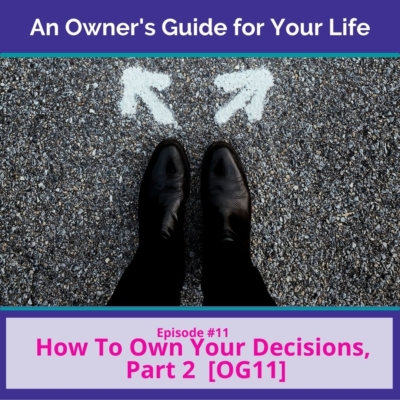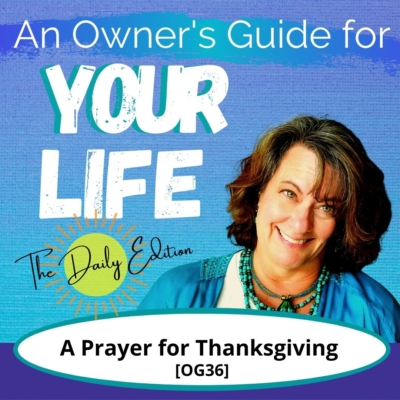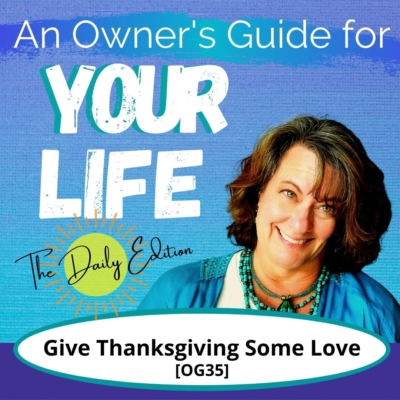How To Own Your Decisions Part 2
Sept 1, 2021

FOLLOW ME
I’ve got some solid suggestions to help you move forward and make decisions you feel good about.
In future episodes, I’ll be featuring questions from listeners- other life owners like you. If you have a question, topic or situation you’d like for us to explore, email me at tracey@tbrowning.com with ‘podcast question’ in the subject line.
What You’ll Learn From This Episode: How To Own Your Decisions Part 2
- A quick review of how and why to physically center yourself
- A sneaky thought that can keep us from focusing on our decisions
- What’s important to know when you decide and some ideas to get different perspectives on what you’re deciding
- What keeps us from finalizing a decision (and I am working on this one myself)
- Is it good or bad or a mixed bag to have a lot of choices?
- ‘Decide once’ guideline
- The research behind it
- Why hard decisions are hard
Featured On The Show | How To Own Your Decisions Part 2
- The Jam Study in The Art of Choosing https://sheenaiyengar.com/
Connect with me online!
Enjoy The Show?
Like what you’re hearing? I would greatly appreciate your review in Apple Podcast!
Don’t miss an episode- listen and subscribe via Anchor | Spotify | Google | Breaker | Pocket | RadioPublic | Apple Podcast | Stitcher | iHeart | Castbox | Listen Notes | TuneIn | Podchaser | Overcast | Downcast | Podcrucher | icatcher | Castaway2 | Podcast Republic | BeyondPod | AntennaPod | doubleTwist | Podcast Addict | PlayerFM
Learn More About TraceyContact Tracey
Follow Me On LinkedIn
How To Own Your Decisions Part 2
Hey, I’m glad you’re here! This is episode 11 and we’re continuing our conversation about how to OWN our decision-making.
From the ‘what do I want to get done today” choices all the way up to the ‘which job offer do I accept’, we’ve got all types of decisions to make in life.
Let’s talk today about the times when it’s clear you need to make some sort of a decision but your best choice isn’t nearly as clear.
I’ll start with this disclaimer
This is not an all-inclusive, best ever guide on everything you ever wanted to know to make decisions.
I do have solid suggestions to help you move forward and make decisions you feel good about.
Thinking about this particular episode on decision making has been an exercise of making decisions for me. And, just so you know, I practice what I preach.
So let’s review, just for a minute, what we talked about in the last episode:
An average adult faces 35 thousand decisions a day, of course lots of little ones in there so obviously this is a hugely helpful skill to have particularly for those of us who want to own our lives.
What we talked about then is that you want to prepare yourself to make your decision by centering yourself
Our physical bodies have a lot of information to give us about what we’re thinking and feeling AND give us a lot of help. Remember we did this quick demo about how to center yourself.
Roll your shoulders up, back and down and relax them away from your ears
Hold your head up, sit up straight and be comfortable
Really you’re just opening your body and taking a deep breath, getting oxygen flowing through your lungs and your body, just deep breathing because it’s much easier to feel open mentally and emotionally, where you need to be to make a good decision, it’s easier to feel that way when your body is open.
Plus, your breath gets the oxygen flowing through our bodies and our brains. And that’s pretty important.
When you’re getting ready to make your decisions, your choices, let your body help you.
Now on to an assortment of tips about how to make good choices.
There’s one thing I’ve seen a lot of, it’s kind of sneaky, you may see this going on in your mind, sometimes we catch ourselves thinking that life should ‘just happen’ so taking time and energy to evaluate and make decisions, it feels like a huge burden, like we shouldn’t have to do this much work on it. Planning and deciding can feel like it’s artificial and forced and we want life to just flow naturally.
There’s especially a rub here if we’re going through what we call ‘compare and despair’.
When we’re looking at people who we admire, chances are good that they’ve thought through and planned out and worked hard to get their life choices to some degree or other, right?
But we’re not looking at the behind the scenes, we’re looking at the end result.
We don’t expect to be Olympic level gymnasts after turning one cartwheel in the yard, right? I don’t and I’m not really good at cartwheels either. We do understand that high level performance, like Olympic level performance, takes dedication and practice and thoughtful planning and coaching and all kinds of things. Apply that kind of thinking here to your life.
You create the life you want through your thoughtful choices and where you direct your energy.
It’s not artificial or forced. It’s thoughtful thinking so you can have that kind of life too.
—
An important thing to keep in mind when you’re making decisions is
Know what matters to you.
Kind of standard advice when somebody’s facing a bigger decision is, you know, make your pro and con list and that’s not a bad idea at all. It helps you get all the stuff out of your head, usually it’s kind of swirling around in a jumble in your head so if you’re making a pro and con list, advantages and disadvantages, that kind of thing, it’s getting it out of your head where you can more clearly see what’s happening. You can look at the words on paper or your phone or computer and sometimes just looking at the words helps you see your decision in a different light.
One of my favorite things to do is I like to write on a white board. There’s something about, not just writing, but writing in bigger letters that helps me see things more clearly. I love it. I’m a white board fan.
Another suggestion comes out of the quality field, in manufacturing and industrial environments. It’s called Five Whys.
Ask why five times. Here’s what this looks like. It helps you explore what’s going on to find the cause of a problem. Here it is in action.
Let’s say I’m often late for work. Why? Why are you late for work?
Well, I have trouble getting out the door. Why?
Because I can’t get everything done that I need to do in the morning. Why can’t you get everything done?
I don’t have enough time. Why don’t you have enough time?
Because I hit snooze too many times. Why did you hit snooze too many times?
And this is our fifth why. So listen to how different answers here could lead you to different solutions.
Maybe you hit the snooze alarm too many times because I stayed up too late. Now if you stayed up late, go ahead, you don’t have to limit yourself to five whys, why did you stay up late? Do you need to work on your sleep habits? Do you need a bedtime routine? Do you just need to enforce a bedtime and say I’m not going to stay up until one in the morning, I’m going to go to bed by eleven? Maybe you need to look at how much caffeine you have later in the day. So staying up late, there could be all kinds of things going on there.
Maybe your answer is I hit snooze because it’s easy to do, it’s a habit I’ve developed.
Well, if you have your alarm clock or your phone right beside your bed, maybe the simple solution is to move it so you have to get out of bed or maybe you need a different kind of alarm. So there’s different solutions.
The thing you want to do here with looking to see what matters to you to find your decision point. You might need a different perspective on it. You might need to explore some different things like with the five why’s, it helps you make a more precise, better informed decision about why am I late for work? Well, what it comes down to is I need to move my alarm clock across the room, right?
Helpful things, know what matters to you.
This next one, I’m just gonna talk to myself a little bit here because I am a work in progress on this one. And sometimes I go a little backwards and sometimes I move forward with big steps. But this one is overthinking. Overthinking, overanalyzing. This happens especially if we are perfectionists. We want to maximize our decisions. Here’s a novel thought. It’s a question that I ask myself often these days.
What if I make a decision that’s ‘good enough’? Not perfect, what if it’s just good enough?
Make the good enough decision and move on with life. Well, my recovering perfectionist self is working on this. I’ve shared with people that my mantra as I’ve worked on launching this podcast has been “done beats perfect”. I’ve said it over and over, in part, to remind myself that done beats perfect and, in part, to convince myself that it’s true. For the most part, I’m starting to believe it. For many decisions, simply good enough really is acceptable, and maybe even preferable to making a decision that I’ve agonized and spent hours and hours and hours researching. Maybe just make the good enough decision and move on.
I’ve got to stop and take a breath after that one.
Now, here’s another thing about making decisions.
An abundance of choices is NOT necessarily a good thing.
Choice abundance IS good from a free market economy perspective because competition can give us better quality, pricing and selection so it feels like lots of choice should be good. That part really is good. But from a subjective consumer experience, it’s not that simple. Choices, the amount of choices, and satisfaction have a pretty complicated relationship.
More choices? That just means it’s going to take more time and energy to consider them whether you’re a perfectionist maximizer or not. Having to work your way through more choices, it just takes more time and energy. So what winds up happening here? Well, you know as well as I do what often happens…analysis paralysis. We get frozen in overwhelm because they’re so many things to consider that we just don’t do anything. And once we DO make a choice, our satisfaction is not as high. We’re going to feel anxiety, we’ll feel regret, maybe we’re worried about what we’re missing out on if we didn’t choose the other thing. Researchers are even showing us that we put a lot of self-blame on ourselves if the choices don’t work out when we’ve got all these choices.
Now there’s one study, I just call it the jam study. But it’s such a good example of this.
They did this study in a grocery store and they had 2 different sampling stations. One of them had 24 flavors of jam, oh yay, and the other had only six flavors of jam. So what they looked at was how many samples are we giving away, how much activity are we having but they really expected to see that when you have more choices that more people would then go buy jam.
Well, the results were this. The sampling station with 24 flavors, only 3% of those people went and bought jam. The sampling station with 6 flavors, 10x the number of people went to buy jam.
Now what’s going on here?
Again, it’s complicated but some of it, look at simple math.
When you only have, and I’m going to use numbers that are easier for me to deal with here.
If you only have two options, you have a 50% chance of making the right choice, however you define right. But if you’ve got five options, all of a sudden, your chance of making the right choice, you’ve only got a 20% chance of making the right choice. So 24 flavors of jam, yeah, that was fun tasting them but I don’t know what I want to go buy. I liked four of them and I don’t need four flavors so I’ll just do without.
Now choice overwhelm- this is how it plays out in real life, in real time for me with the podcast.
I can make my podcast episodes about anything I want. It’s An Owner’s Guide for Your Life. Your life include, oh my gosh, all kinds of things. It’s a BIG playground for me and it’s filled with choice. So here’s what happens. I find myself evaluating a lot. I love to read and study and think… ooh, these are my sweet spots. It’s what I excel in, it’s where I’m really, really comfortable. So I want to spend time in my comfort zone that feels better to me than to make choices and move on to do things that I’m less comfortable and less familiar with that need to happen after that for my podcast.
Now this isn’t unique to me.
This is something that every single entrepreneur faces. Deciding what to spend time, energy and money on in their business. It’s much more difficult when there is a lot of information and a lot of methods to choose from. Entrepreneurship is all about decision making and responsibility- whatever your business is.
And typically, the issue isn’t a LACK of information. It’s choosing from an overwhelm of information. It’s especially difficult when an entrepreneur may have moved from being in a job where you’re told what to do and how to do it but then to come out and have complete control and complete responsibility- that’s a LOT. I’ve been doing this for well over a decade now and I promise you, it is a lot. It does get easier if you’re aware of how to make good decisions but it is a lot.
Now, another thing that can be really helpful for you when you’re making decisions is to know what your decision making energy is like. Making decisions- it’s like a muscle. You can build up your muscle strength with making decisions. It’s also like a muscle in that it can fatigue.
Here in our family, we laugh because sometimes, especially by the end of the day, we’re like, “Man, I have made my number of decisions. I am decisioned out. It’s your turn. You decide.”
Know when you’re tired, know when you’re hungry, know when…do you do your best most clear thinking in the morning? Make your important decisions then when your mind’s clear and you’re ready to tackle the day.
Do you have midafternoon slump? It’s probably not the best time to do clear, contemplative thinking about decisions. So know what your decision making energy is like and be aware of decision fatigue.
Here’s a great tip.
Can you make 1 decision that will eliminate a few more or even a lot more decisions?
Like I only buy Duke’s mayonnaise. I could do a great commercial for them. I only buy Duke’s so when I’m in the store, I don’t have to stand there in the aisle and think “Well, this one’s on sale. What about that this, should I get this?” Nope, Duke’s mayonnaise. We all know it. Anybody who goes to shop at the store for my family- it’s the only kind of mayo you buy.
If you’re going out to eat, you can have a guideline of “I’ll go to this restaurant and I’ll pick the second special on the menu. That’s what I’ll do.” Now that works pretty well if you’re not a finicky eater and if you tend to get tied up in “Oh what do I want? I can’t decide, I can’t decide.” Just pre-make the decision.
I’m going to choose the second special on the menu and it’s going to be a delightful experience.
Steve Jobs is an example of this in what to wear. He was famous for always wearing a black mock turtleneck, jeans, and sneakers. He didn’t waste his decision making energy on what to wear. So it really is worth some time thinking about
Where in your life can you implement “DECIDE ONCE” guidelines?
I like calling them guidelines because it doesn’t have to be a hard and fast rule. It’s a guideline so you can decide differently if it really makes a difference to you. But have that ‘decide once’ guideline.
Now when it comes to big life decisions, keep this part in mind. So often it’s really more about who we’re becoming in the process. That’s what’s mattering more than the decision itself. The decision is really just a way to get there.
So I’ll use this as an example. I had a decision to make months ago about whether or not to start a podcast.
As I’m trying to decide what to do, you would think the decision was really about whether to start the podcast.
Here’s what it’s really about- it’s my overall goals.
My goals are to help people get what they want in life.
I’ve got a goal of building my life and mindset coaching practice.
My biggest goal, I just want to use my gifts and talents to make the world a better place.
So those are my goals.
So my decision is about how do I want to reach these goals?
I can do it in different ways.
The decision I made to start a podcast- it is helping me reach those goals but I could do it without a podcast.
This is more about personally developing, refining my voice, building my body of work, and reaching out into the world.
So you know, at first blush, start a podcast or not, that felt like the main decision. No. It’s what it’s leading me to. And it’s good to remember so often there are often many paths that lead where you want to go.
Sometimes these decisions, they feel HARD, not because we’re hard-headed or we’re ignorant or we don’t care. No. They’re hard because there’s not a clear cut way to measure them. It’s not a 1+1=2 kind of thing.
When we’re considering what matters to us, what we value, what’s important in our life- we can’t easily measure things like kindness and joy (which happen to be two values of mine). We can’t measure them like we can height or weight or count dollars. So that’s more challenging to compare and evaluate. It’s not always an apples to apples comparison. It’s an apples to pineapples and dog food comparison, I don’t know.
What I keep in mind is that one of my life decisions, one of my foundational things, that I decided a long time ago, is I’m going to enjoy my journey. It’s not just a bumper sticker.
It is a bumper sticker but it’s MORE than a bumper sticker. Enjoy the journey. What that means to me is that I want to be mindful of my choices and how they help me become the person I want to be. And enjoying my journey means I want to be aware of and fully experiencing my days and my moments. The FULL experience of life- the hard stuff, the easy stuff, the fun stuff, the sad stuff, all of it. That brings me joy.
So, fellow life owners, embrace your decisions and use them to create the life you want.
Thanks for listening and sharing the podcast!
Keep your requests and suggestions coming! I love hearing from you- I’m adding to my topic list.
Now let’s go live, love, MAKE DECISIONS and change the world.
The Curse of Knowledge [OG40]
The Curse of Knowledge Dec 9, 2021 [...]
Your Best December Ever [OG39]
Your Best December Ever Dec 6, 2021 [...]
Thoughts on a Hole [OG38]
Thoughts on a Hole Dec 2, 2021 [...]
It’s My Birthday- Lessons I’ve Learned from Life
It's My Birthday- Lessons I've Learned from Life Nov 29, 2021 [...]
A Prayer for Thanksgiving
A Prayer for Thanksgiving Nov 24, 2021 [...]
Give Thanksgiving Some Love
Give Thanksgiving Some Love Nov 23, 2021 [...]

![The Curse of Knowledge [OG40] 1 The Curse of Knowledge](https://www.tbrowning.com/wp-content/uploads/2021/12/curse-of-knowledge-e1639073128165.jpg)
![Your Best December Ever [OG39] 2 Your Best December Ever](https://www.tbrowning.com/wp-content/uploads/2021/12/best-december-e1638791418771.jpg)
![Thoughts on a Hole [OG38] 3 Thoughts on a Hole](https://www.tbrowning.com/wp-content/uploads/2021/12/hole-e1638451588290.jpg)


